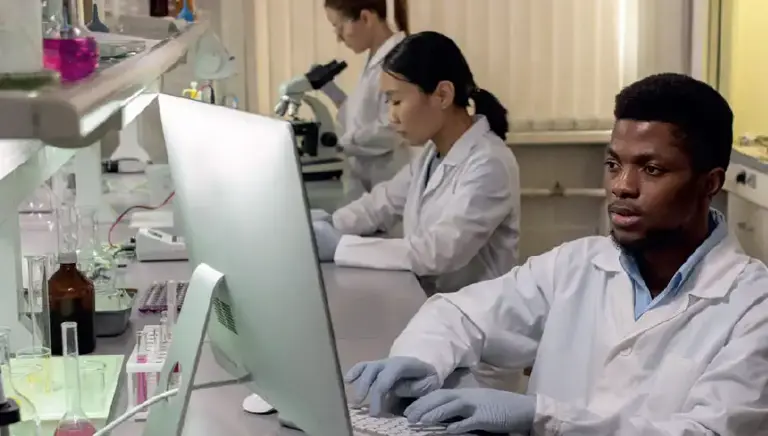New survey shows collaboration between pharmaceutical industry and UK academia is growing
The Association of the British Pharmaceutical Industry (ABPI) has today published its latest survey on the links between industry and academia, which show how the pharmaceutical industry is supporting student training and research placements.
There are huge benefits from collaboration between industry and academia. It's great to see that links between them are increasing and bringing added value to the work of both. Andrew Croydon, ABPI's Director of Examinations, Skills and Education Policy
The data illustrate various types of academia-industry interaction including apprenticeships, undergraduate placements, PhD studentships, and post-doctoral researcher awards.
The data comes from a biennial survey conducted by the ABPI and responded to by a consistent core of pharmaceutical companies in order to show trends over time. The 2022 survey received responses from 14 major pharmaceutical companies.
This year’s survey shows that links between the pharmaceutical industry and academia are increasing.
- The number of apprentices being trained by pharmaceutical companies captured, is at its highest ever, up by around a third since 2019 at 825. This is an almost 3-fold increase since 2015.
- Undergraduate placements in the pharmaceutical industry have increased by more than 16% since 2019 at 697, although slightly down on the all-time high of 704 in 2017.
- PhD studentships with an industrial placement have increased nearly 10% since 2019 to 601, although still down on the 2003 high of 702
- Postdoctoral jobs have doubled since 2019 and now stand at 564, the highest ever captured in the history of survey
Andrew Croydon, ABPI’s Director of Examinations, Skills and Education Policy said:
“There are huge benefits from collaboration between industry and academia. This includes the practical – like sharing of resources and the ability to use academic knowledge to solve real-world problems in industry. There are also intangible benefits, like demystifying each other’s sectors, and building networks with diverse teams from different scientific backgrounds.
“It’s great to see that links between industry and academia are increasing and bringing added value to the work of both.”
Apprenticeships
Apprenticeships are continuing to rise in the pharmaceutical industry ranging from entry level to master’s level – the survey captured an increase of 32.9% in apprenticeships since 2019 (Table 1).
The survey particularly captured an increase in people pursuing higher apprenticeship qualifications equivalent to bachelors and masters degrees, with twice as many level 6 and 7 apprenticeships compared to 2019 (Fig 1, Table 2).
|
Year |
Number of apprenticeships |
|
2015 |
287 |
|
2017 |
388 |
|
2019 |
621 |
|
2022 |
825 |
Table 1. Number of apprenticeships captured by the industry-academic links survey by year. 2022 data are compiled from 14 survey respondents including nil returns.
|
Level |
Equivalent educational level |
|
|
Intermediate |
2 |
GCSE |
|
Advanced |
3 |
A level |
|
Higher |
4,5,6 and 7 |
Foundation degree and above |
|
Degree |
6 and 7 |
Bachelor’s or master’s degree |
Table 2. Apprenticeship level and equivalent educational level.

Figure 1. Apprenticeships in pharmaceutical industry by level. 2022 data are compiled from 14 survey respondents including nil returns. Refer to previous iterations for more information on previous years.
Undergraduate placements
70% of undergraduate placements fell within R&D, manufacturing, or other clinical roles. Other popular roles included marketing, communications, and IT. Most placements lasted one year.
Undergraduate placements were hosted by 79 different academic institutions all across the UK, with the University of Bath hosting the most at 61 placements in both the 2022 and 2019 surveys (Fig 2).

Figure 2. Top 20 academic institutions for supporting undergraduate industrial placements with pharmaceutical industry. 2022 data are compiled from 14 survey respondents including nil returns. Refer to previous iterations for more information on previous years.
Graduate training placements
212 graduate training programme places were identified in 2022, down 31.6% from 2019.
The survey found that more than 1 in 3 graduate training programmes are focused on manufacturing (up from 17.7% in 2019 to 35.4% in 2022).
Graduate training programmes in clinical R&D rose significantly from 5.5% in 2019 to 20.8% in 2022.
Programmes included rotations through various areas in both scientific and non-scientific roles including HR, IT, marketing and sales, medical, and finance.
Graduate industrial placements
43 graduate industrial placements were identified in 2022, down 56.6% from 99 placements in 2019.
Graduate industrial placements with pharmaceutical industry span various areas including clinical R&D, pre-clinical R&D, manufacturing, IT, HR, finance, and marketing. According to our 2022 survey, most graduate placements are within pre-clinical R&D sectors (37.2%). This shows a change in the most popular graduate industrial area from regulatory in 2019.
PhD studentships
601 PhD studentships were captured in the 2022 survey which is an increase of 10% on previous years.
There were 45 institutes captured in UK that support PhD studentships, with the University of Cambridge hosting most at 91 (Fig 3).
There were worldwide collaborative opportunities spanning Australia, Germany, Sweden, USA.

Figure 3. Top 20 academic institutions for supporting PhD studentships with pharmaceutical industry. 2022 data are compiled from 14 survey respondents including nil returns. Refer to previous iterations for more information on previous years.
Funding partners:
In contrast to 2019 survey data, the 2022 survey highlighted the EPSRC and MRC as the largest funding partners for PhDs across the pharmaceutical industry, closely followed by the BBSRC (Table 3). These 3 research councils accounted for the funding of 61% of studentships. However, it is important to note that not all research councils may contribute equally in terms of financial support. For example, most projects funded by the MRC were co-funded projects.
|
Source of funding |
Amount of PhD studentships |
|
EPSRC - 20.3% |
159 |
|
MRC - 20.3% |
159 |
|
BBSRC - 19.9% |
156 |
|
Industry - 14.0% |
110 |
|
University - 7.0% |
55 |
|
Other - 1.8% |
14 |
|
Unreported - 16.6% |
130 |
Table 3. Source of funding for PhD studentships. 2022 data are compiled from 14 survey respondents including nil returns.
Postdoctoral researchers
The number of postdoctoral positions has doubled since 2019 and now stands at 564, the highest ever captured in the survey.
1 in 4 positions were funded for 5 or more years.
The survey captured collaborations with 127 institutions identified across 29 countries, many comprising of multiple collaborative partners per project.
Just under half of the captured postdoctoral positions are based in the UK (nearly 48%). 1 in 4 postdocs were based in the USA (more than 25%) (Table4). University of Cambridge hosts the most postdoctoral researchers in the UK (15%) (Fig 4).
|
Country |
Number of postdocs |
% of total |
|
UK |
276 |
48.94 |
|
USA |
143 |
25.35 |
|
Other Europe |
76 |
13.48 |
|
Other Non-Europe |
26 |
4.61 |
|
Unknown |
43 |
7.62 |
Table 4. Postdoctoral researchers by region. 2022 data are compiled from 14 survey respondents including nil returns.

Figure 4. Top 10 academic institutions for supporting postdoctoral researchers. 2022 data are compiled from 14 survey respondents including nil returns. Refer to previous iterations for more information on previous years.
- Education
Last modified: 20 September 2023
Last reviewed: 20 September 2023

